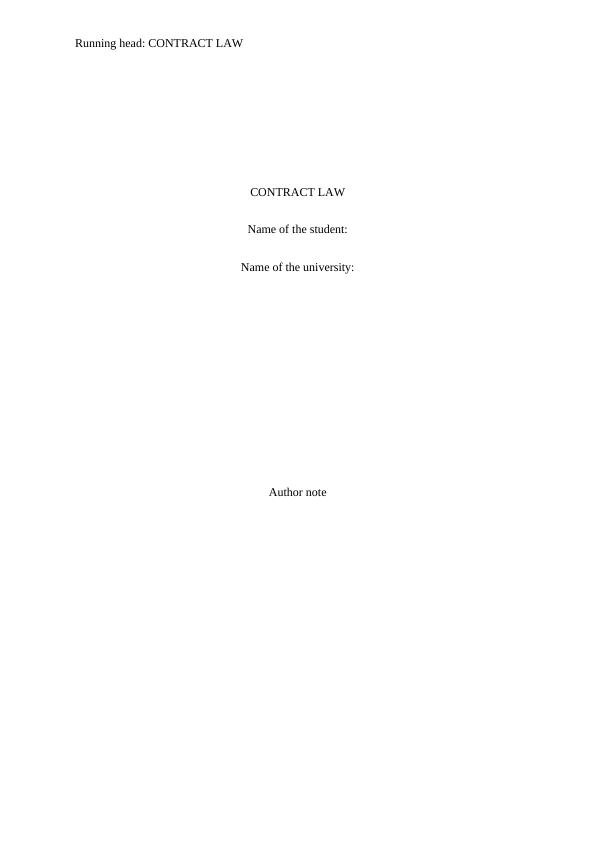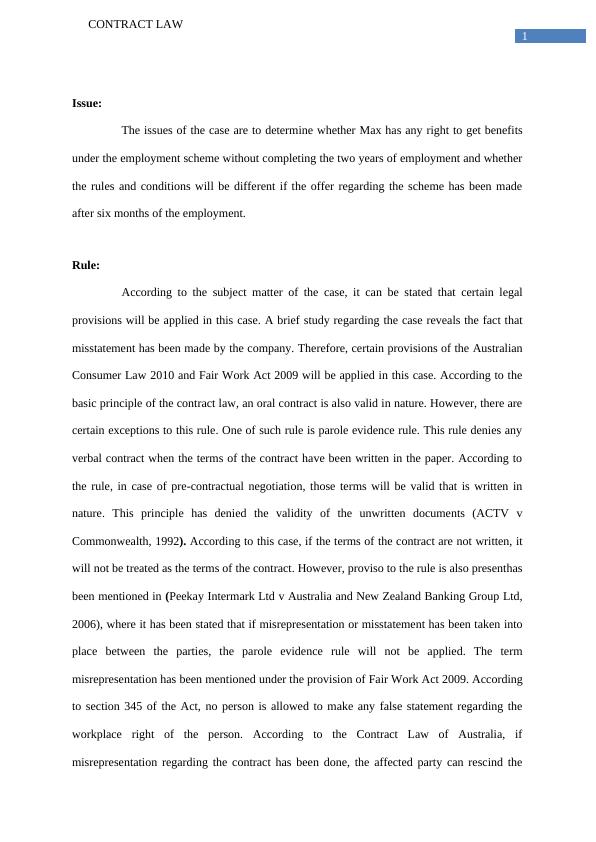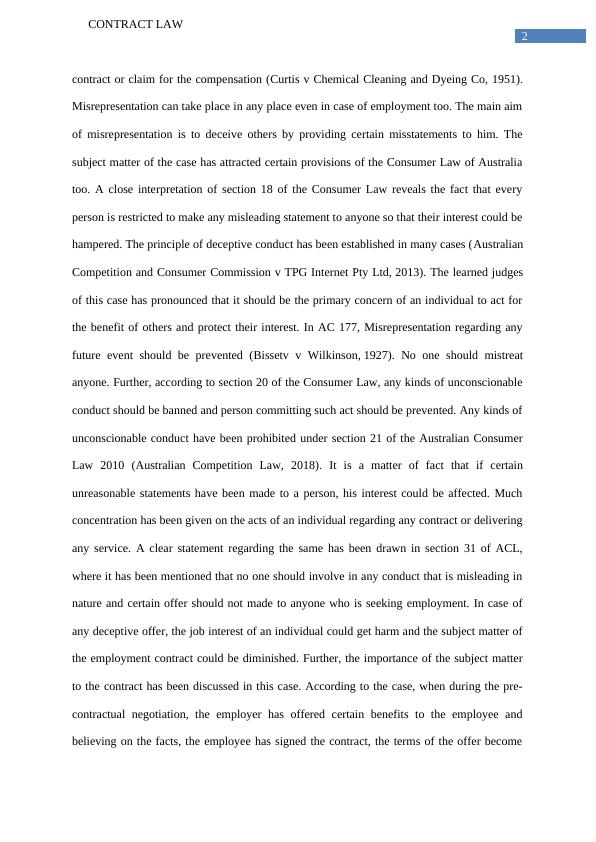Contract Law: Misrepresentation and Verbal Contracts
Added on 2023-06-10
9 Pages2224 Words118 Views
Running head: CONTRACT LAW
CONTRACT LAW
Name of the student:
Name of the university:
Author note
CONTRACT LAW
Name of the student:
Name of the university:
Author note

1
CONTRACT LAW
Issue:
The issues of the case are to determine whether Max has any right to get benefits
under the employment scheme without completing the two years of employment and whether
the rules and conditions will be different if the offer regarding the scheme has been made
after six months of the employment.
Rule:
According to the subject matter of the case, it can be stated that certain legal
provisions will be applied in this case. A brief study regarding the case reveals the fact that
misstatement has been made by the company. Therefore, certain provisions of the Australian
Consumer Law 2010 and Fair Work Act 2009 will be applied in this case. According to the
basic principle of the contract law, an oral contract is also valid in nature. However, there are
certain exceptions to this rule. One of such rule is parole evidence rule. This rule denies any
verbal contract when the terms of the contract have been written in the paper. According to
the rule, in case of pre-contractual negotiation, those terms will be valid that is written in
nature. This principle has denied the validity of the unwritten documents (ACTV v
Commonwealth, 1992). According to this case, if the terms of the contract are not written, it
will not be treated as the terms of the contract. However, proviso to the rule is also presenthas
been mentioned in (Peekay Intermark Ltd v Australia and New Zealand Banking Group Ltd,
2006), where it has been stated that if misrepresentation or misstatement has been taken into
place between the parties, the parole evidence rule will not be applied. The term
misrepresentation has been mentioned under the provision of Fair Work Act 2009. According
to section 345 of the Act, no person is allowed to make any false statement regarding the
workplace right of the person. According to the Contract Law of Australia, if
misrepresentation regarding the contract has been done, the affected party can rescind the
CONTRACT LAW
Issue:
The issues of the case are to determine whether Max has any right to get benefits
under the employment scheme without completing the two years of employment and whether
the rules and conditions will be different if the offer regarding the scheme has been made
after six months of the employment.
Rule:
According to the subject matter of the case, it can be stated that certain legal
provisions will be applied in this case. A brief study regarding the case reveals the fact that
misstatement has been made by the company. Therefore, certain provisions of the Australian
Consumer Law 2010 and Fair Work Act 2009 will be applied in this case. According to the
basic principle of the contract law, an oral contract is also valid in nature. However, there are
certain exceptions to this rule. One of such rule is parole evidence rule. This rule denies any
verbal contract when the terms of the contract have been written in the paper. According to
the rule, in case of pre-contractual negotiation, those terms will be valid that is written in
nature. This principle has denied the validity of the unwritten documents (ACTV v
Commonwealth, 1992). According to this case, if the terms of the contract are not written, it
will not be treated as the terms of the contract. However, proviso to the rule is also presenthas
been mentioned in (Peekay Intermark Ltd v Australia and New Zealand Banking Group Ltd,
2006), where it has been stated that if misrepresentation or misstatement has been taken into
place between the parties, the parole evidence rule will not be applied. The term
misrepresentation has been mentioned under the provision of Fair Work Act 2009. According
to section 345 of the Act, no person is allowed to make any false statement regarding the
workplace right of the person. According to the Contract Law of Australia, if
misrepresentation regarding the contract has been done, the affected party can rescind the

2
CONTRACT LAW
contract or claim for the compensation (Curtis v Chemical Cleaning and Dyeing Co, 1951).
Misrepresentation can take place in any place even in case of employment too. The main aim
of misrepresentation is to deceive others by providing certain misstatements to him. The
subject matter of the case has attracted certain provisions of the Consumer Law of Australia
too. A close interpretation of section 18 of the Consumer Law reveals the fact that every
person is restricted to make any misleading statement to anyone so that their interest could be
hampered. The principle of deceptive conduct has been established in many cases (Australian
Competition and Consumer Commission v TPG Internet Pty Ltd, 2013). The learned judges
of this case has pronounced that it should be the primary concern of an individual to act for
the benefit of others and protect their interest. In AC 177, Misrepresentation regarding any
future event should be prevented (Bissetv v Wilkinson, 1927). No one should mistreat
anyone. Further, according to section 20 of the Consumer Law, any kinds of unconscionable
conduct should be banned and person committing such act should be prevented. Any kinds of
unconscionable conduct have been prohibited under section 21 of the Australian Consumer
Law 2010 (Australian Competition Law, 2018). It is a matter of fact that if certain
unreasonable statements have been made to a person, his interest could be affected. Much
concentration has been given on the acts of an individual regarding any contract or delivering
any service. A clear statement regarding the same has been drawn in section 31 of ACL,
where it has been mentioned that no one should involve in any conduct that is misleading in
nature and certain offer should not made to anyone who is seeking employment. In case of
any deceptive offer, the job interest of an individual could get harm and the subject matter of
the employment contract could be diminished. Further, the importance of the subject matter
to the contract has been discussed in this case. According to the case, when during the pre-
contractual negotiation, the employer has offered certain benefits to the employee and
believing on the facts, the employee has signed the contract, the terms of the offer become
CONTRACT LAW
contract or claim for the compensation (Curtis v Chemical Cleaning and Dyeing Co, 1951).
Misrepresentation can take place in any place even in case of employment too. The main aim
of misrepresentation is to deceive others by providing certain misstatements to him. The
subject matter of the case has attracted certain provisions of the Consumer Law of Australia
too. A close interpretation of section 18 of the Consumer Law reveals the fact that every
person is restricted to make any misleading statement to anyone so that their interest could be
hampered. The principle of deceptive conduct has been established in many cases (Australian
Competition and Consumer Commission v TPG Internet Pty Ltd, 2013). The learned judges
of this case has pronounced that it should be the primary concern of an individual to act for
the benefit of others and protect their interest. In AC 177, Misrepresentation regarding any
future event should be prevented (Bissetv v Wilkinson, 1927). No one should mistreat
anyone. Further, according to section 20 of the Consumer Law, any kinds of unconscionable
conduct should be banned and person committing such act should be prevented. Any kinds of
unconscionable conduct have been prohibited under section 21 of the Australian Consumer
Law 2010 (Australian Competition Law, 2018). It is a matter of fact that if certain
unreasonable statements have been made to a person, his interest could be affected. Much
concentration has been given on the acts of an individual regarding any contract or delivering
any service. A clear statement regarding the same has been drawn in section 31 of ACL,
where it has been mentioned that no one should involve in any conduct that is misleading in
nature and certain offer should not made to anyone who is seeking employment. In case of
any deceptive offer, the job interest of an individual could get harm and the subject matter of
the employment contract could be diminished. Further, the importance of the subject matter
to the contract has been discussed in this case. According to the case, when during the pre-
contractual negotiation, the employer has offered certain benefits to the employee and
believing on the facts, the employee has signed the contract, the terms of the offer become

End of preview
Want to access all the pages? Upload your documents or become a member.
Related Documents
Contract Law: Legal Entitlement to Employment Schemeslg...
|7
|1779
|123
Common Principles of Commercial Law Assignment PDFlg...
|9
|2986
|126
Contract Law: Understanding the Elements, Rules, and Unavoidable Termslg...
|2
|840
|218
Business Law: Exclusionary Clause and Vitiating Factors in a Contractlg...
|4
|618
|297
Business Law Assignmentlg...
|9
|1814
|384
Legal Business Law: Contract Law, Australian Consumer Law, and Promissory Estoppelslg...
|8
|1873
|255
